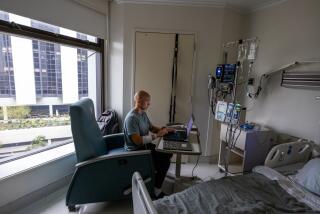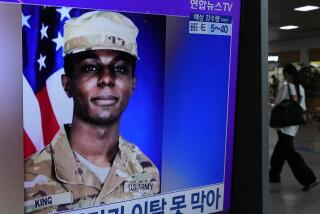Ex-U.S. Soldier Needs Medical Help, Tokyo Says
- Share via
TOKYO — The almost 40-year mystery surrounding the alleged defection of former U.S. Army Sgt. Charles Robert Jenkins to North Korea seemed a step closer to unraveling, as the Japanese government Wednesday pressed its case that the 64-year-old should come to Japan for medical help as early as this weekend.
There were suggestions that Tokyo and Washington were near an agreement on how to deal with the legal and political sensitivities surrounding Jenkins, who could face arrest and extradition once he is in Japan.
Howard H. Baker Jr., U.S. ambassador to Japan, told reporters at the embassy this morning, “It is certainly possible he could come to Japan, that the U.S. could insist on its rights, but the actual custody would not be sought or consummated under some circumstances.”
Jenkins has been in seclusion at a hotel in Jakarta, Indonesia, since an emotional reunion last week with his Japanese wife after nearly two years apart. The wiry former soldier reportedly had an abdominal operation in April in North Korea and is “not well,” Japanese Prime Minister Junichiro Koizumi said.
“I have been told it would be better for him to undergo treatment at a hospital in Japan,” Koizumi said.
Baker expressed no outright opposition. “The U.S. government is sympathetic to his health condition,” he said.
Japanese media, quoting unnamed government officials today, reported the outlines of a deal with Washington in which Jenkins would go to Japan for medical treatment. The reports said the U.S. had promised not to take legal action while he was in the hospital, and would form a committee with the Japanese government to reach an agreement on his fate.
Indonesia has no extradition treaty with the U.S., which is why it was chosen for Jenkins’ reunion with his wife, Hitomi Soga.
Washington is also aware that Koizumi, the administration’s closest regional ally, has invested an enormous amount of personal political capital in trying to bring Jenkins and the couple’s two young adult daughters to Japan to join Soga.
Publicly, Washington officials repeated this week that the U.S. would seek to extradite and prosecute Jenkins if he visited Japan. Legal observers in Japan say that to avoid conviction, Jenkins will almost surely have to explain why he disappeared across the Korean peninsula’s demilitarized zone while on patrol in 1965, and why he later participated in taunting, anti-American propaganda on behalf of communist North Korea.
American relatives of the North Carolina native argue that he was captured and brainwashed by North Korean troops, although Jenkins never claimed to be anything but happy living under the dictatorship.
With few facts or witnesses to the event, his explanation is eagerly awaited.
“He holds all the cards, he has all the facts,” said Annette Eddie-Callagain, an American defense lawyer based in Japan who specializes in representing military personnel in court-martial cases. “He can say: ‘I was abducted. I had to do it to stay alive.’ It’s all going to be based on what he says. Only then can the military decide what to charge him with, whether desertion or aiding the enemy, and whether he can do some sort of plea bargain.”
The Jenkins family saga has become the dominant news story in Japan.
Images of the family’s reunion in Jakarta were repeated seemingly endlessly on a slow-motion loop, and television commentators pontificated on such matters as the daughters’ jewelry choices. (The verdict: good.)
The obsession focuses mainly on Soga’s own tragic tale. Kidnapped by North Korean agents as a teenager in the 1970s, she was forced to teach the country’s spies to speak Japanese. While in captivity, she married Jenkins.
Soga was finally freed along with four other Japanese abductees in a moment of North Korean-style glasnost in 2002. But Jenkins -- and their daughters -- remained behind because of the potential court-martial.
More to Read
Sign up for Essential California
The most important California stories and recommendations in your inbox every morning.
You may occasionally receive promotional content from the Los Angeles Times.













